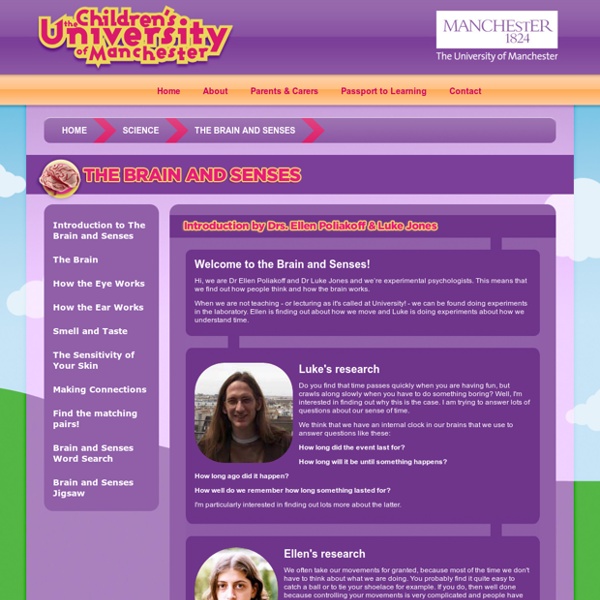The Skeleton
Learn about the skeleton and why we need it! © 2012 This website is produced by the Student Recruitment, Admissions and International Development Division at The University of Manchester
How Your Brain Works"
Every animal you can think of -- mammals, birds, reptiles, fish, amphibians -- has a brain. But the human brain is unique. Although it's not the largest, it gives us the power to speak, imagine and problem solve. It is truly an amazing organ. The brain performs an incredible number of tasks including the following:
This unit includes five worksheets which ask the student to identify items related to a specific sense. The sixth worksheet is a review of the five senses. No answer key provided.
Neuroscience For Kids
The smell of a flower - The memory of a walk in the park - The pain of stepping on a nail. These experiences are made possible by the 3 pounds of tissue in our heads...the BRAIN!! Neuroscience for Kids has been created for all students and teachers who would like to learn about the nervous system. Discover the exciting world of the brain, spinal cord, neurons and the senses. Use the experiments, activities and games to help you learn about the nervous system.
Your Amazing Brain
You carry around a three-pound mass of wrinkly material in your head that controls every single thing you will ever do. From enabling you to think, learn, create, and feel emotions to controlling every blink, breath, and heartbeat—this fantastic control center is your brain. It is a structure so amazing that a famous scientist once called it "the most complex thing we have yet discovered in our universe." Your brain is faster and more powerful than a supercomputer.
The 5 Senses Worksheets – Free Science Worksheets for Kids
Can you smell, hear, touch, taste and see things? Good. That means your 5 senses are working just fine. Can you imagine what life would be like if you couldn’t do one or more of these things? These free printable 5 Senses Worksheets help you learn more about your body.
The Five Senses
ABCya is the leader in free educational computer games and mobile apps for kids. The innovation of a grade school teacher, ABCya is an award-winning destination for elementary students that offers hundreds of fun, engaging learning activities. Millions of kids, parents, and teachers visit ABCya.com each month, playing over 1 billion games last year.
How Many Bones Are in Your Body?
How does that old song go again? The knee bone’s connected to the…? Shin bone? Thigh bone? Both? Aarrgghh!



